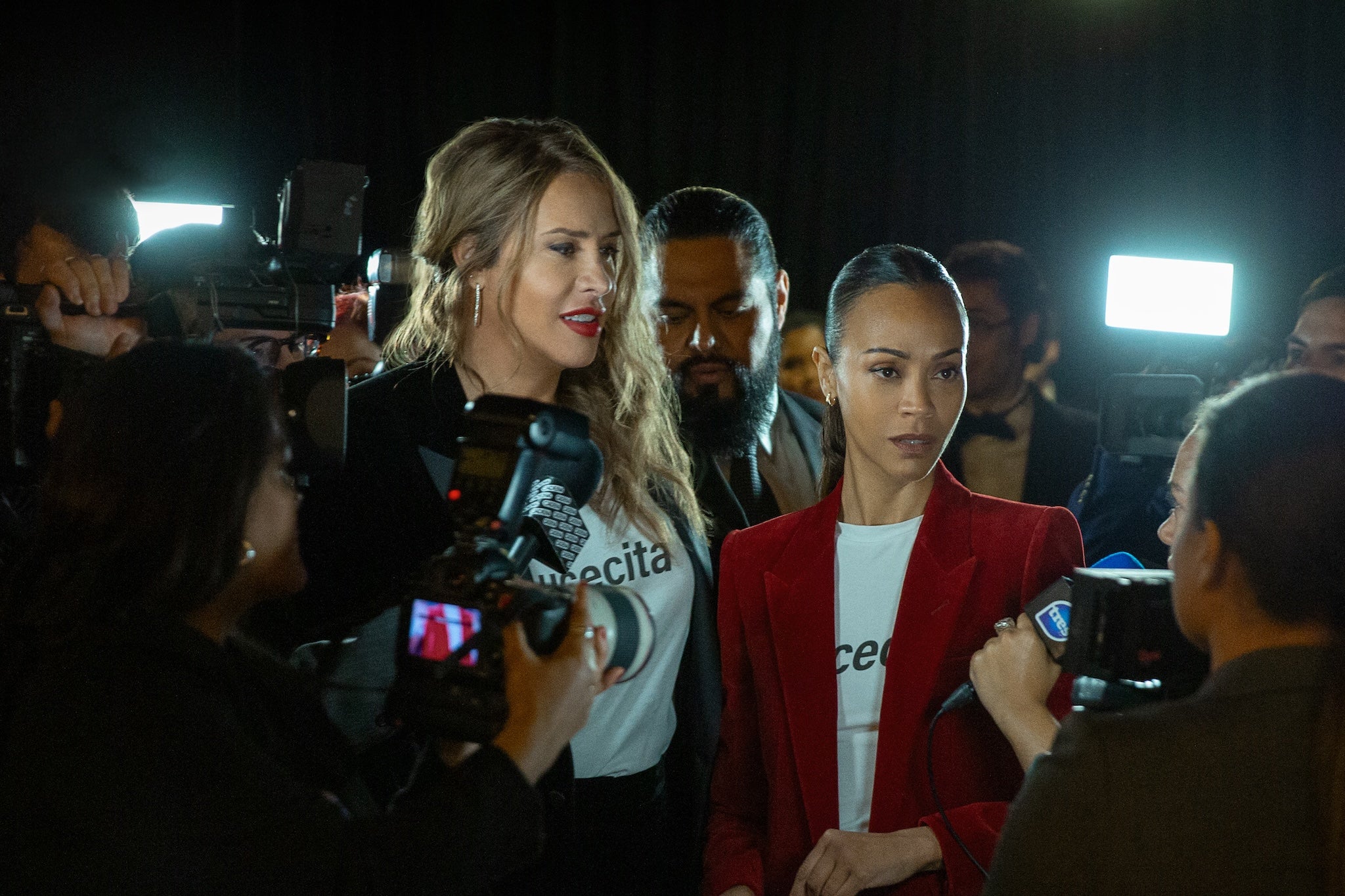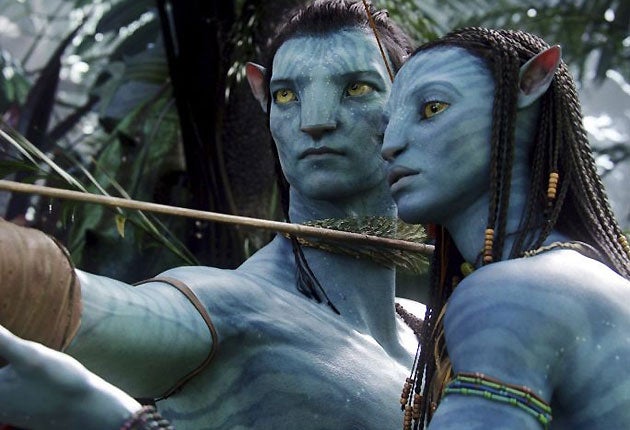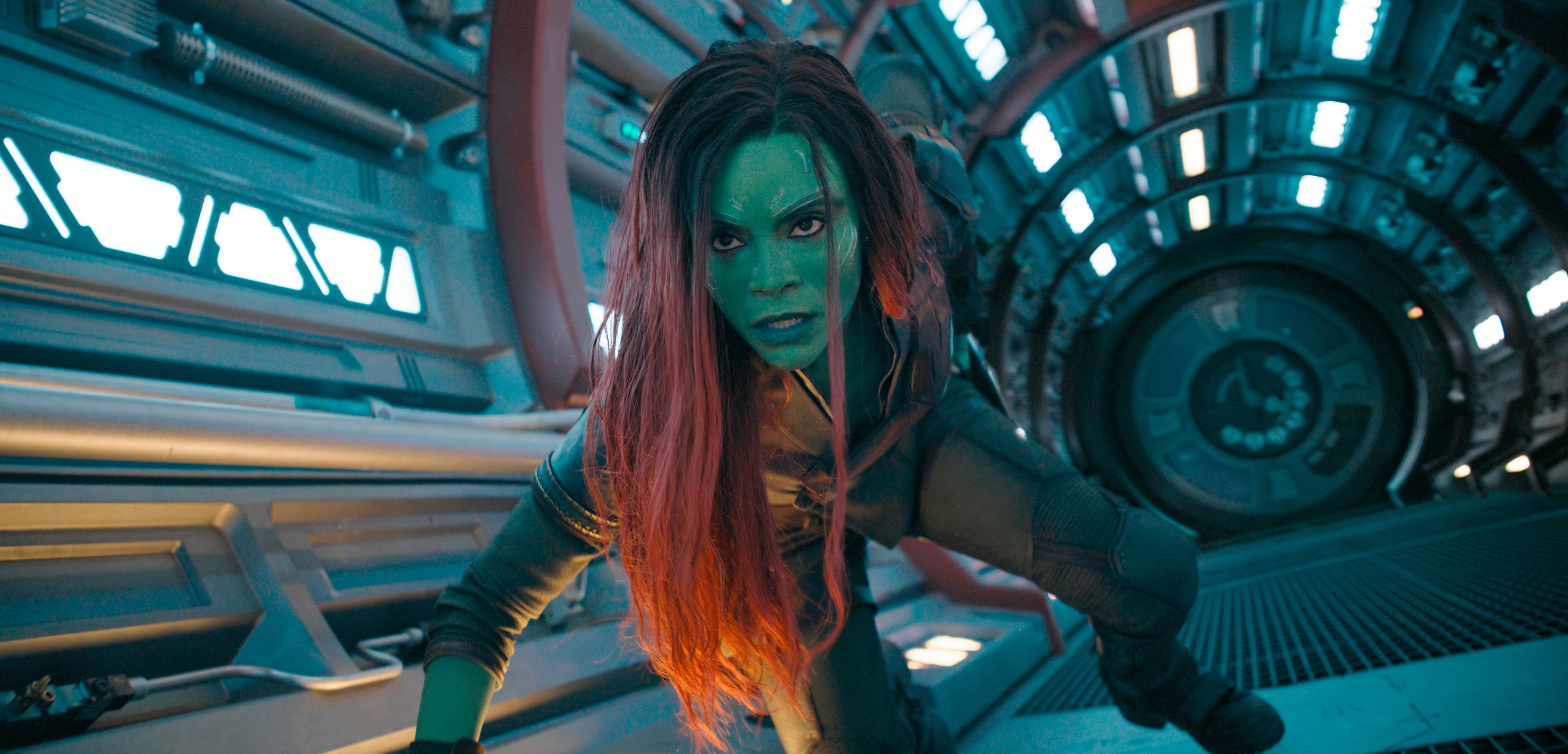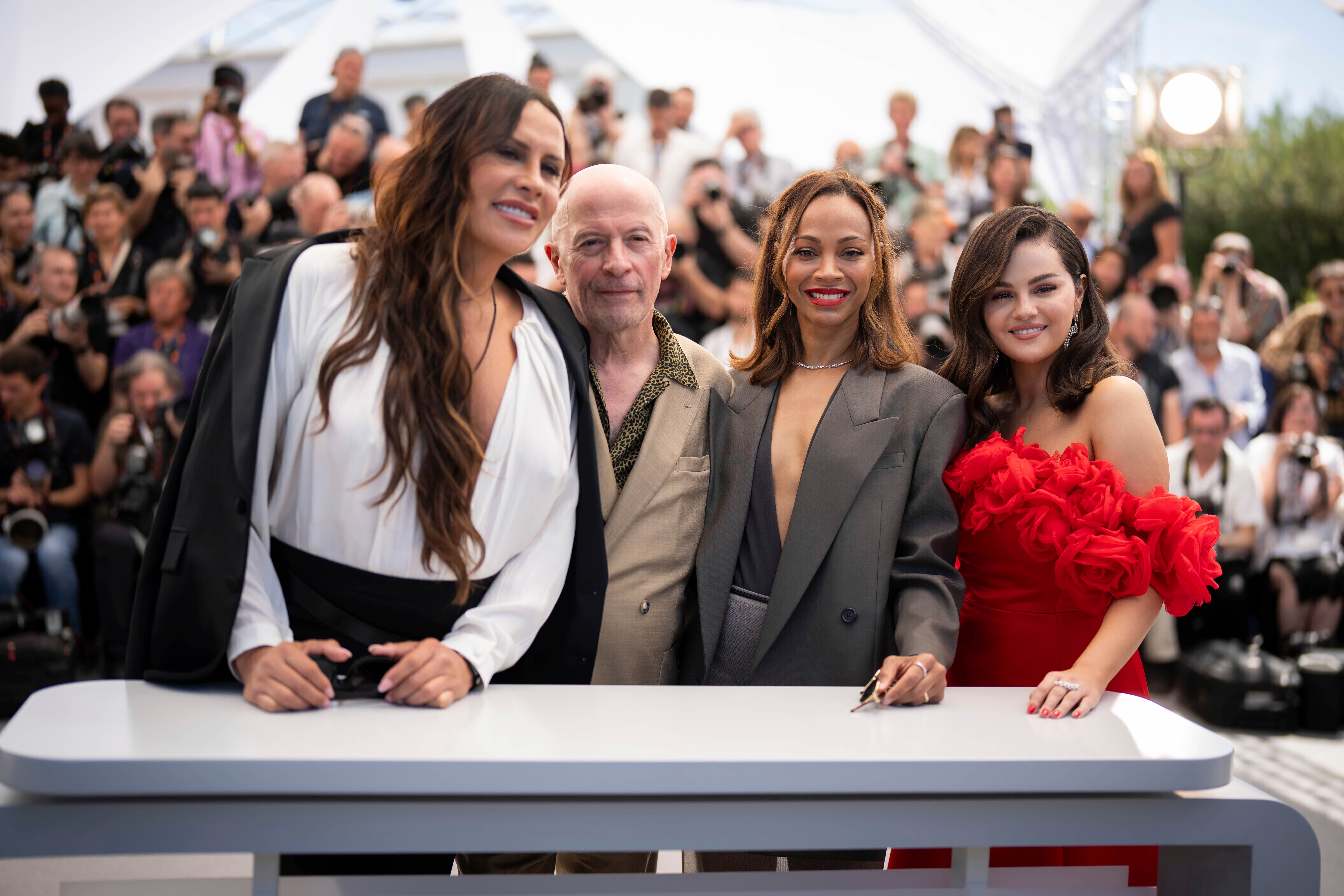
Around the time of her 40th birthday, Zoe Saldaña started to feel pangs of imposter syndrome. She tells me this as she pulls a piece of lint from the sole of her black tights. Minutes ago, the actor was padding down the hotel corridor barefoot, heels slung in her hand and a big black coat draped over her shoulders. It looked like the end of a heady night out for the star; in reality, it was 3pm on a weekday. But Oscars campaigning is a full-time job. And Saldaña is throwing herself in at the deep end.
Hence the hot water and lemon steaming in her cup – and the unseasonably balmy temperature in the hotel room. “I hope you don’t mind if it’s a little warm,” she apologises, upping the thermostat.
Back to those feelings of self-doubt. At 46, Saldaña is one of Hollywood’s most bankable actors. Of the top five highest-grossing films of all time, she stars in three: Avatar, Avengers: Endgame, and Avatar: Way of Water. (She’s also in Star Trek – a fourth instalment is long in development.) “I know that from the outside it can look like, ‘Oh, she’s successful – what does she have to feel like an imposter about?’” Saldaña says.
And yet, caught in that fun, frothy riptide of sequels upon sequels, Saldaña lost something important. “How do I speak about this in a way that won’t make those wonderful filmmakers feel like I’m letting them down?” she begins. “Because I’m not taking those moments for granted; they’re the reason I’m here. But when you play a part in something that was so special in the beginning, and because of its success now, feeds a commercial machine that requires a lot more time and therefore now runs on its own… Unless you’re a person that has creative control on the project, the level of input you have as an artist is [diminished]. Now I play a smaller part in a bigger thing.”
And that would be fine, Saldaña continues; in fact, that would be great – if only she wasn’t still so hungry. “I have an energy, a fire that is very much still alive, and I want to challenge myself,” she says. Enter Emilia Perez. The film, released on Netflix last month and now a frontrunner for the Oscars next year, is nothing if not a challenge – as much for its stars as for its viewers.
In it, Saldaña plays Rita, a brilliant but overlooked defence lawyer who finds herself embroiled in the life of a Mexican drug kingpin (Karla Sofía Gascón), who reveals that she is trans, asking Rita to help fake her death and organise gender-reassignment surgery. Not to mention the ensuing logistics of her post-transition life and that of her family.
Part gory cartel drama, part stunningly off-kilter jazz-hands musical, and directed by Jacques Audiard, it’s a big swing for Saldaña in every sense – a trapeze, really. But it continues to pay off; at Cannes in May, Saldaña shared the award for Best Actress with her three co-stars. Earlier this week, she was nominated for a Golden Globe. For the first time in her 25 years in the biz, Saldaña is a significant Oscar contender. All it took was a complete career one-eighty.
What’s more, the Puerto Rican Saldaña speaks in Spanish, the first time she has acted in her mother tongue. “Which had its own set of challenges,” she says now. “I thought it was going to be easier, but it was the same.” She was brought up bilingual in Jackson Heights, Queens, yet she feels she never quite grasped a “knowledge of either language on an academic level”.

Her dyslexia also didn’t help, but then this is something she has struggled with throughout her career. Recently she found herself reluctant to accept a lead role in Taylor Sheridan’s spy thriller, Special Ops: Lioness, in which she plays a stoic alpha-agent, because it was so dialogue-heavy. In the end, she said yes and put in the work. She requested scripts weeks in advance and hired someone to read lines with her daily.
It’s true that Saldaña is capable of telegraphing depths of feeling without saying a word – a physical prowess that can be traced to her background in dance. (She quit ballet as a teen out of pride, knowing she did not “have the feet” to be the best.) In fact, it was her en pointe performance as Eva, a gum-snapping ballerina in 2000’s Centre Stage, that launched her film career. A couple of romcoms later (including a memorable turn opposite Britney Spears in Crossroads), she landed Star Trek and Avatar in the same year. From there it was a straight shot to mega stardom.
By now, Saldaña knows her way around a franchise, but she famously had a tough time on the set of her first: Pirates of the Caribbean. In subsequent interviews she spoke out about feeling “lost in the trenches of it a great deal”. She also talked about forgiving producer Jerry Bruckheimer when he reached out years later to apologise after hearing of her bad experience on set. Saldaña is a big believer in forgiveness – and redemption.

“Prosecution in the court of public opinion is defining a lot of our generations right now,” she says. “We’re very quick to judge and discard people, instead of allowing them the chance to redeem themselves. I don’t want to be part of that group who sever people at the knees or assassinate someone’s character so easily.” She felt more aligned with so-called cancel culture when she was younger. There is a desperation, she says, when you’re younger, to define yourself by defining what you are not.
It’s a running joke that Saldaña is from another galaxy, so frequently is she cast in sci-fi flicks. There’s Gamora, the lean, green fighting machine in the Marvel franchise; the blue-skinned, bug-eyed warrior princess Neytiri of James Cameron’s Avatar; and Star Trek’s Nyota Uhura, whose quicksilver intelligence was first embodied by Nichelle Nicols. The Saldaña who lives in my head is out of this world, but the Saldaña I meet today is firmly of this Earth – and prone to the very human impulse to natter on. “I’m sorry! It takes me so long to land the plane,” she laughs.
I have been in situations where I don’t feel included in the decision-making as much as men
But like the shapeshifting aliens she is so good at playing, Saldaña is ready for a transformation. And Emilia Perez is just the thing. It’s a film of firsts for Saldaña. For one thing, she isn’t the only woman on set – or even the only woman of colour. “It’s funny,” she says. “In some experiences when I’ve been the only one, I don’t notice it because the environments are welcoming and very inclusive. In others, it can be isolating. And I have been in situations where I don’t feel included in the decision-making as much as men. That feels really disheartening. It’s disappointing, it’s hurtful and it’s othering.”
It’s also very different from her upbringing: Saldaña is one of three sisters, and when she’s with her family, she’s surrounded by women. On set, as sometimes the only Latina in the room, she can feel the burden of representation. “It’s a big responsibility, because you’re not just there for yourself, you’re carrying the weight of your community,” she says. “At times, that can cloud the way you make artistic and creative decisions. When there are others like you [around], it just doesn’t.”

Saldaña shares three children (twins Cy and Bowie, and son Zen) with her husband Marco Perego, whom she met in a movie-worthy meet cute on a plane in 2013. “Two things happen simultaneously,” Saldaña says of the moment she became a mum. “Our environments aren’t yet fully supportive of women wanting success while having a family. And on the other side, it’s what you’re doing to yourself, because there is this level of guilt and punishment for not always being home.” She’s the first to admit she’s still navigating the choppy waters 10 years in – but that’s OK. “I’m always willing to do the work,” she says.
What she isn’t OK with is the way in which working mums are sometimes perceived. “At school, [there is sometimes the attitude that] when you’ve been absent because you’re working and providing, it means you don’t care. All of the credit goes to the partner that’s home, which is so deserved, but it’s also their job in the same way that it is my job… When I come home, I don’t go upstairs and take a bath. I roll up my sleeves and it’s homework, emails to parents, calls to teachers, Christmas cards, birthday gifts.”

Raising kids means a reshuffle of priorities. “My children are second generation by me,” she says. “It’s my responsibility to make sure they know who they are before the world tells them who they are, so there’s a yearning to reconnect [with my roots].”
Regarding awards, Saldaña has perhaps been unfairly overlooked in the past, I suggest. The sci-fi gigs with which she made her name aren’t natural Oscar contenders, but her performances ought to be. In the Avatar films, for example, Saldaña endows Neytiri with unforeseen depth and humanity, a glint of zealotry gleaming in those huge swimming-pool eyes. Yet her portrayal, while lauded by critics, went unrecognised by the Academy. Campaigns by Cameron to have Saldaña nominated for an Oscar failed to persuade those in charge.
Does she feel that awarding bodies struggle to look past cobalt-blue skin or digitally engineered doe eyes? “They do,” Saldaña says. “Old habits die hard, and when you have old establishments, it’s really hard to bring forward change. And I understand that, so I’m not bitter about it, but it is quite deflating when you give 120 per cent of yourself into something. I mean, not winning is OK, not being nominated is OK, but when you’re overlooked and then minimised and completely disregarded…”

She recalls people arguing that her performance in Avatar was the feat of technicians alone. “I know the difference between that and what we did,” she says. Again, though, she understands the resistance. Saldaña is nothing if not understanding; she has no chips on her shoulder. “At some point you have to ask yourself: why is it that I do what I do? Is it so others can give me approval? Or is it because I don’t want to do anything else?”
Which isn’t to understate how she feels about being recognised for Emilia Perez. “I can’t tell you what this moment means to me,” she says. It’s the culmination of “25 years of hard work and putting one foot in front of the other to have people finally go, ‘Oh, you’ve been here this whole time.’ Which I have, but also there have been moments when I questioned it: am I here? Do I matter?” She may not end up with a golden statuette, but Saldaña is certainly embracing a new horizon.
‘Emilia Perez’ is out on Netflix now







